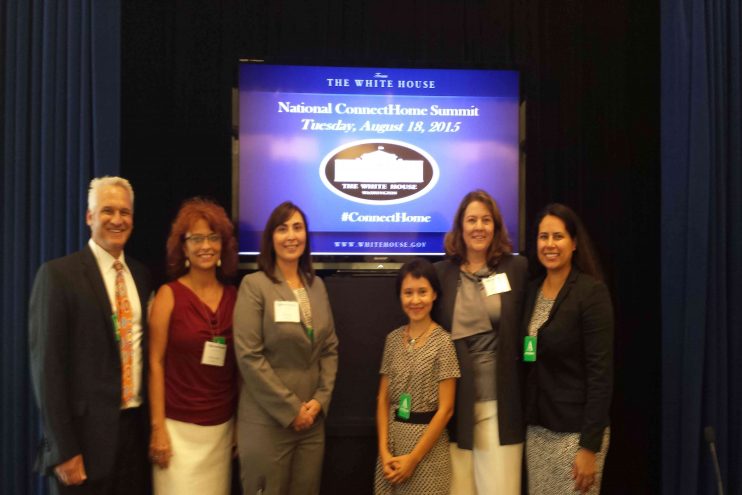As told by Sylvia Blanco, HACA Executive Vice President
Earlier this week, KXAN reported on U.S. Department of Housing and Urban Development (HUD) Secretary Julian Castro’s visit to the Reimagining Cities conference. Recently, we met with Castro at the first convening of a HUD and White House initiative called ConnectHome, a program in which we serve as a Mentor City for 28 participating communities.
Reflecting on our journey over the last nine months, we’d like to share a few lessons learned that may help other initiatives figure out the best approach for their programs:
It takes a village
Housing Authority of the City of Austin (HACA) research shows fewer than 30 percent own a computer device and only 15 percent of households have an Internet connection.
Texas school children must take mandatory digital literacy/technology tests each year. A child without a computer at home is at a natural disadvantage. To make up for this, some children are doing homework on unreliable smart phones using free public broadband at locations that aren’t always safe.
A digital divide this large is impossible for one organization to solve alone.
A variety of entities with diverse strengths and insight have provided essential support for Austin Pathways’ Unlocking the Connection digital inclusion program through strategic planning, civic engagement, STEM/STEAM and computer refurbishment. Evaluation of outcomes and impact, provided by the University of Texas’ Moody College of Communication, also is a key element.
The Unlocking the Connection pilot program, established in January, focuses on the three legs of the digital inclusion stool: broadband, computer devices and digital literacy training.
Broadband: Google Fiber has provided free basic broadband to HACA’s public housing residents for 10 years. We have registered an estimated 80 percent of residents for free basic broadband. A few residents at the 33-unit Manchaca Village are already connected to the Internet, and several more continue to schedule installation appointments.
Digital literacy: In our pilot phase with Austin Free-Net, the nonprofit has trained more than 60 HACA residents enrolled in Tech Starters classes to use a computer, a tablet and a smart phone, as well as helping them to meet their own digital literacy goals.
Computer devices: More than 50 public housing residents have graduated from the Tech Starters class, earning free refurbished computers, thanks to our innovative partnership with Austin Community College.
A dedicated group of vendors serve a continuum of HACA residents — from Pre-K to early adult, to workforce and seniors. We have representatives from KLRU and United Way for Greater Austin whose Play to Learn and Ready to Learn programs equip young children and their families with digital literacy and help children enter kindergarten on equal footing with their peers; we have tech clubs through Boys and Girls Clubs – providing after-school and summer enrichment programs in a safe and nurturing environment; Skillpoint Alliance is another key provider of digital literacy training and STEM youth camps; and Latinitas offers media and coding workshops for HACA youth and their families.
Foundation for success
In its 2013 Strategic Plan, HACA identified digital inclusion as a major initiative. At about the same time, the City of Austin established a Digital Inclusion Planning Committee. We’ve worked hand in hand to develop a solid framework to bring affordable Internet to low-income Austinites.
In addition, HACA’s Scholarship foundation was rebranded as Austin Pathways, a 501(c)(3) to promote education and general welfare of people living in subsidized housing programs. The agency also created a position to drive the program.
Buy-in from staff is critical. We found our staff, and we, are digitally included to varying degrees. Just because staff members carry the same smart phone, doesn’t mean they use it the same way. A Community Development staff member that looks for medical information online is much more likely to think all seniors should have access to Medline Plus on the refurbished computers they earn. A Resident Council leader that is technically savvy and aware of security issues online is much less likely to think those same seniors – or children – who are new to the Internet should be online. Staff members who believe the Internet is a utility, and a right, may say 100 percent should have it. On the other hand, staff members that believe the Internet is a luxury may say it’s only essential for households with children who need it for educational purposes. Some of our own maintenance staff members do not have computers at home; they drive their children to school or the library to use the computer. Other maintenance staff has asked to be trained to provide technical support on property.
Digital inclusion Austin is a unique recipe of collaboration and cooperation. Every city will have its own formula. For us, a diverse community of stakeholders who are passionate about reducing inequity for people in public housing came together to lend the essential elements that make the difference between residents using the Internet on someone else’s terms and allowing them to integrate the promise of the digital economy into their own lives.
In the future, we hope to leverage highly specific partnerships and broader new partnerships and continue to move forward in a spirit of learning with our partners to serve our residents as our technology environment and digital culture continue to evolve.
